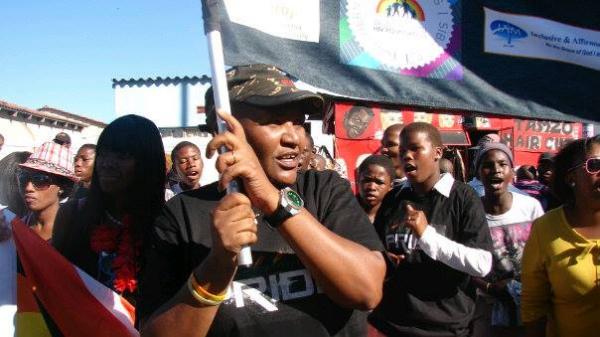

Funeka Soldaat waves a flag at Nyanga’s first gay pride march. Photo by Nyameka Nkosana.
22 May 2013
On Saturday 18 March about 300 people gathered at NY1 Gugulethu and marched to the Nyanga Football Stadium in the first gay pride march in Nyanga.
About 200 to 300 people took part. Nyanga was chosen for the march because it has been the site of recent violence against LGBTI (lesbian, gay, bisexual, transgender and intersex) people. The march was organised by several organisations including Free Gender, Triangle Project, Sonke Gender Justice, the Treatment Action Campaign, ARASA, iThembelam, the Inclusive Affirming Ministries, Gender Dynamics and the Desmond Tutu Foundation.
Cape Town already has an annual Gay Pride march that attracts thousands of supporters each year. The event has become known for its music, floats and parties. However, people in parts of the LGBTI community in Cape Town, particularly in areas such as Khayelitsha, Gugulethu and Nyanga, have said that they do not feel included in events and that it does not cater to LGBTI people from working class communities and the issues they struggle with, such as hate crimes.
Funeka Soldaat is the Project Co-ordinator at Free Gender. She said that they wanted to unite their community and avoid similar organisational tensions that characterised Johannesburg Pride last year, where activists from the One in Nine Campaign tried to disrupt the Johannesburg Pride to raise awareness of what many LGBTI people experience in their communities and to protest the commercialisation of gay pride. This resulted in the activists being assaulted by some of the marchers. She said that Cape Town Gay Pride must become more representative of the LGBTI community regardless of race or class. She said that its board should be more representative and that the organisation should conduct more outreach programmes.
Mabhuti Mkangeli of Triangle Project, said that the pride march took place after a spate of hate crimes that have shaken communities in South Africa and in the context of a lack of acceptance of LGBTI people and their human rights.
Mkangeli said the marchers mostly comprised members of the LGBTI community, however, many passers-by also joined in the march and voiced their support. Pre-march community events resulted in many “gogos [grandmothers] and parents” also participating to support the rights of their children according to Mkangeli. The police were also present and “kept the peace”, he added.
An aim of the march was to promote acceptance of LGBTI people by their families. Mkangeli said that the theme of the discussions was, “I am your child and you must accept your children for who they are.” Some of the outcomes of this included support for establishing awareness programmes, forming committees to initiate conversations at schools and churches, and encouraging parents and “gogos” to lead marches to promote LGBTI rights.
Mkangeli said that they did not have the resources for posters and flyers to promote the event to the larger LGBTI community in Cape Town. The organisers used social media but according to Mkangeli, the response was limited. Mkangeli said that they hope that the pride march in Nyanga will become a regular event that promotes acceptance by celebrating LGBTI people and showing that homosexuality is not a “Western import”.
South Africa is recognised for having progressive laws and policies that protect the rights of LGBTI people. It is is currently the only country in Africa where it is legal for LGBTI people to marry. However, the reality for many LGBTI people is not consistent with this progressive legislation. According to a report titled We’ll Show You You’re a Woman, issued by Human Rights Watch in December 2011, many of the hate crimes against LGBTI people in South Africa include sexual and physical assault and are mostly directed at black lesbians and transgender men.